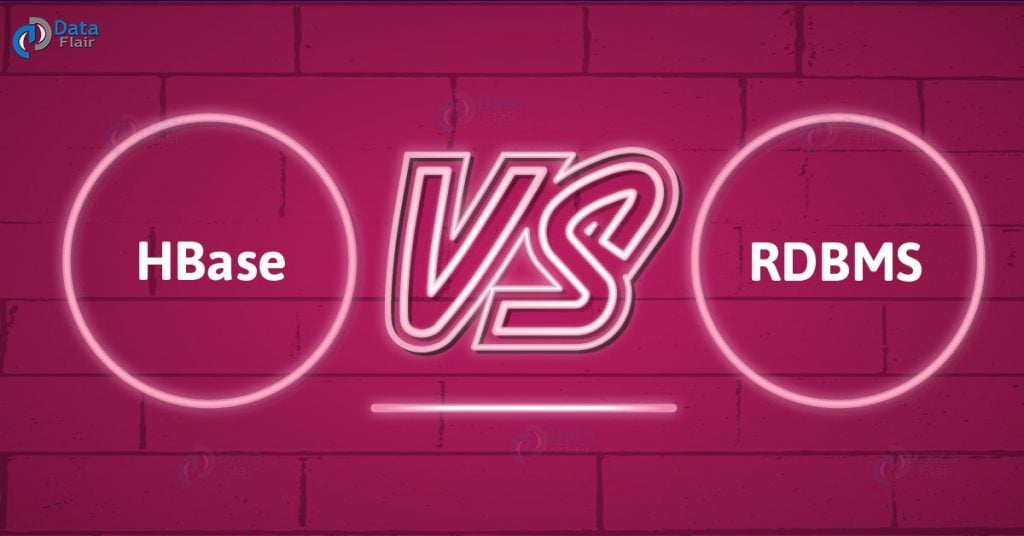Today, in this article “HBase vs RDBMS: Feature Wise Comparison” we will learn the complete comparison of HBase vs RDBMS, on the basis of several features. Both HDFS and RDBMS are varying concepts of processing, retrieving and storing the data or information.
Still, there are some reasons that HBase has lacks comparison to conventional relational databases which are even existed for so long now.
So, let’s begin HBase vs RDBMS
Difference Between HBase & RDBMS
i. What is HBase?
An open source and sorted map data built on Hadoop is what we call HBase. Basically, it is column-oriented and horizontally scalable. Moreover, it offers APIs enabling development in practically any programming language.
Also, it offers random real-time read/write access to data in the Hadoop File System, as it is a part of the Hadoop ecosystem that.
ii. What is RDBMS?
RDBMS refers to Relational Database Management Systems. Basically, systems like SQL, MS SQL Server, IBM DB2, Oracle, MySQL, and Microsoft Access are based on RDBMS.
Since it is based on the relational model introduced by E.F. Codd so it is called Relational Database Management System (RDBMS).
Feature Wise Comparison of HBase vs RDBMS
Below we are discussing the feature wise difference of HBase vs RDBMS, let’s explore this in detail:
i. Database Type
- HBase
HBase is the column-oriented database. On defining Column-oriented, each column is a contiguous unit of page.
- RDBMS
Technology is evolving rapidly!
Stay updated with DataFlair on WhatsApp!!
Whereas, RDBMS is row-oriented that means here each row is a contiguous unit of page.
ii. Schema-type
- HBase
Schema of HBase is less restrictive, adding columns on the fly is possible.
- RDBMS
However, Schema of RDBMS is more restrictive.
iii. Sparse Tables
- HBase
HBase is good with the Sparse table.
- RDBMS
Whereas, RDBMS is not optimized for sparse tables.
iv. Scale up/ Scale out
- HBase
HBase supports scale out. It means while we need memory processing power and more disk, we need to add new servers to the cluster rather than upgrading the present one.
- RDBMS
However, RDBMS supports scale up. That means while we need memory processing power and more disk, we need upgrade same server to a more powerful server, rather than adding new servers.
v. Amount of data
- HBase
While here it does not depend on the particular machine but the number of machines.
- RDBMS
In RDBMS, on the configuration of the server, amount of data depends.
vi. Support of
- HBase
For HBase, there is no built-in support.
- RDBMS
And, RDBMS has ACID support.
vii. Data type
- HBase
HBase supports both structured and nonstructural data.
- RDBMS
RDBMS is suited for structured data.
viii. Transaction integrity
- HBase
In HBase, there is no transaction guaranty.
- RDBMS
Whereas, RDBMS mostly guarantees transaction integrity.
ix. JOINs
- HBase
HBase supports JOINs.
- RDBMS
RDBMS does not support JOINs.
x. Referential integrity
- HBase
While it comes to referential integrity, there is no in-built support.
- RDBMS
And, RDBMS, supports referential integrity.
Features of HBase and RDBMS
- Why HBase?
- HBase is horizontally scalable.
- Integrations with Map/Reduce framework.
- Moreover, it is possible to refer HBase as a key-value store or column family-oriented database.
- Why RDBMS?
- Here, in form of rows and columns, data stores.
- By using SQL queries, it also supports virtual tables from where we can retrieve data.
- For the purpose of data uniqueness, RDBMS provides a primary key.
- Also, it offers referential integrity.
Conclusion
Hence, in this HBase tutorial, we saw the difference between HBase & RDBMS. Moreover, we have seen the complete comparison and the features of HBase and RDBMS. However, if any doubt occurs regarding HBase vs RDBMS, feel free to ask in the comment section.
